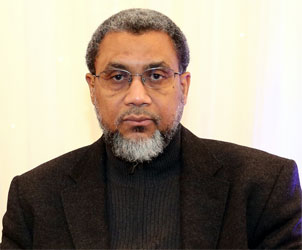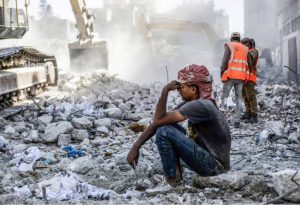By Dr. Daud Abdullah*
In the same way that the “Seventh Cavalry” was the staple means for American settlers in the Old West to be rescued in the movies, calls for a multinational intervention force have become the standard blueprint for dealing with the threats of “terror” and insurgency. Such calls are currently being heard in Somalia, Mali and the countries surrounding the Chad basin. Arab League Secretary-General Nabil Al-Arabi believes that the Arab countries are desperately in need of such a force.
Speaking at the opening of the latest session of the League’s council of foreign ministers, Al-Arabi explained that his proposed military security force would serve a number of functions: fight against the terrorist organisations; help in the process of preserving peace; secure relief and humanitarian operations; and protect civilians. Will it work though?
Every one of the countries which now teeter on the verge of collapse, from Iraq through Syria to Yemen, Egypt and Libya, have all been ruled by military dictators for decades. As such, it goes without saying that the dictators were ultimately responsible for the chaos that has engulfed their respective countries. It is, therefore, hard to envisage how the same military establishments so deeply embedded in such countries can suddenly become part of a regional solution for the said chaos. It is a bizarre twist of the “poacher turned gamekeeper” analogy.
Also Read: Be Careful of the Trap of Deploying Peacekeeping Forces to Gaza
Furthermore, judging from the Arab League’s record, it is not clear exactly who will be the beneficiaries of this latest proposal. Since assuming the leadership of the organisation in 2011, Al-Arabi has, for example, never visited the Gaza Strip, despite the fact that his office is in neighbouring Egypt. Neither the Israel-Egyptian blockade of the Palestinians in the territory nor Israel’s murderous military offensives have been enough to merit even a token visit of solidarity from this senior Arab official.
Still on the question of Gaza, it was truly mind-boggling to hear the intervention of Egypt’s foreign minister, Samih Shoukri, at the Arab League meeting. He spoke of the need to lift the siege on Gaza, which he concedes is experiencing a distressing humanitarian crisis that could lead to another round of fighting. As if his own country is playing no part in maintaining the blockade, Shoukri called on the international community to pressure Israel to honour its legal obligations as the occupying power towards the Palestinian people.
There are only two conclusions to be drawn from the stance of the Egyptian authorities: either they have no sovereign control over their border with Gaza, or they are too indebted to and enthralled by Israel to open the Rafah crossing. Israeli officials have on their part said repeatedly that the level of security cooperation provided by Egypt has far exceeded their wildest expectations. Whichever way we look at it, if Egypt cannot deliver aid to one and a half million Palestinians in Gaza, how will they do it for 10.3 million displaced Syrians?
Apart from the obvious contradictions in the Arab League’s policies, there are practical problems associated with the proposed Arab military force. To begin with, there is no single definition of who the “terrorists” are who will be targeted. While Egypt and the UAE, for example, designate the Muslim Brotherhood as a “terrorist organisation”, other members of the League such as Qatar, Tunisia and Morocco do not. Arab regional politics have become so absurd that while an Egyptian court can declare Hamas to be a “terrorist entity”, the country’s political establishment still insists that the ruling does not affect national policy towards the Palestinians.
Also Read: The Forty-Four-Days of Glory: Azerbaijan’s Struggle for Justice and Peace
In addition, given the close ties between several governments and armed militias across the region it is unthinkable that the Arab League would ever be able to devise a uniform and consistent approach to these non-state actors. While the Saudis and Iraqi governments appear to be synchronised in the fight against ISIS, for example, will they see eye to eye on the Shia militias operating in Iraq, Syria and Yemen?
For all its ambition, the proposed joint military force seems doomed to fail; there is every reason to believe so. Throughout the organisation’s history, the meetings of Arab League interior ministers have been recognised widely as the best organised. Unlike other ministerial meetings and summits, they are always attended by everyone, with no absentees. This fact notwithstanding, the august body has failed to prevent the region’s decline into the chaos that we are witnessing today.
On the surface, the new proposal seems to be a desperate attempt to legitimise and build upon what has already started. Since the killing by ISIS of the Jordanian pilot Muadh Al-Kasasbeh, several Arab countries have joined in the bombing campaign against the extremist group in Syria. Similarly, both Egypt and the UAE have carried out airstrikes in Libya. None of these operations have produced any conclusive results apart from more civilian deaths and destruction.
The prospects for the future remain grim. Like the Western governments and commentators who deny that there is a causal relationship between their interventionist wars in the Middle East-North Africa region and the spread of terrorism, the Arab governments continue to bury their heads in the sand and deny the link between the absence of freedom and democracy in their countries and the spread of extremist networks.
Also Read: Palestine Solidarity Month: A Collective Movement for Al-Aqsa and Palestine’s Freedom
Until and unless we root out the socio-economic and political reasons why people opt for violence in the face of repression and exploitation, the region will remain a permanent magnet for insurgents and “terrorists” and an area of dangerous instability which threatens us all.(T/R05/P3)
*Director, Middle East Monitor, MEMO, London; Contibutor of Mi’raj Islamic News Agency (MINA).
Mi’raj Islamic News Agency (MINA)
Source: https://www.middleeastmonitor.com/resources/commentary-and-analysis/17438-military-options-for-mena-chaos-will-fail-its-time-to-root-out-the-causes
Also Read: Hassan al-Turabi: A Controversial Thinker from Sudan

































 Mina Indonesia
Mina Indonesia Mina Arabic
Mina Arabic